Key language points
Key Language points of B3 Unit 5 Canada-The True North

Key Language points of B3 Unit 5 Canada-The True North1. settle down定居, 平静下来, 专心于/settle down to do sth专心于做什么/settle for勉强接受/settle on sth.选定,决定2. have a flair for 对...有天赋/have agift for poetry [art, language] 有诗[艺术, 语言]的天才/be gifted in在…方面有才华/a gifted boy一个有才华的孩子3. figure out合计为, 计算出, 解决, 断定,领会到/figure on:“料想;估计”/ theindex finger 食指4. catch sight of sb./sth.看见,瞥见/at firstsight 乍一看/in/within sight 看得见,在视线内/out of sight 看不见,在视线外/lose sight of 看不见....;忘记考虑.../at the sight of 看见…5. flow into the sea流入大海/flow to流向/flow through流经/flow away流逝/flowdown 流下6. in the distance在远处/from a distance从远方7. the Prime Minister首相8. natural resources自然资源9. go/live downtown到/住在闹市区10. a special meeting/in particularly尤其,特别/especially11. on board在船(或飞机等)上/go onboard登(船、飞机)/ on the board 将在会上讨论/ a board of directors 董事会12. be rich(strong/weak/poor)in在…方面富有、强壮、虚弱、贫穷13. terrify (sb.) into doing威胁(某人)做某事/be terrified of 害怕…14. go eastwards到东去15. east by north正东偏北/south by west正南偏西:16. take measures(steps/action) to do sth.采取措施做某事17. a broad shoulder宽宽的肩膀/broadmind宽广的胸怀/broad knowledge宽广的知识面18. the North Pole 南极/ the polar bear北极熊/two polar两极19. on the border of在...的边界上/将要;接近于, 濒临于20. would rather+v….than 相当于情态动词词组,表示“宁愿”、“宁可”,强调主观意愿或看法=prefer to do … ratherthan do宁愿[愿意]...而不愿21. prefer短语:prefer to do 表示一时性的喜欢/prefer doing表示长时间的,一贯性的喜欢/prefer to do rather than do/wouldrather do sth than do sth 喜欢…胜过…/prefer sth. /doing sth. ... to sth./doing sth. ... 喜欢...而不喜欢; 喜欢...胜过22. be close to接近,靠近/a close friend一位密友/be far from远离23. cross the bridge =go across thebridge过桥24. at dawn拂晓时/from dawn to dark一整天/dawn breaks破晓25. less than小于/less bright不比…亮26. extremely cold极其冷/extreme sports极限运动27. a slight wind(rain/difference/difficulty)微风、小雨、小区分、小困难28. thousands of square kilometers数千平方公里29. travel around the world周游世界30. take a trip to去旅行/pay a visit to去参观,拜访31. all the way一路上, 一直; 完全/all thetime 一直/all the best万事吉利/all thesame仍然1. The Yellow River is the secondlongest river in China. 黄河是中国第二最长的河。
完整版深圳牛津版英语七年级上重点词汇语法

Unit 1 Making friends1. Key wordsGerman hobby Germany world blog country mountain Japan grammar age elder flat sound dream friendly yourself complete US engineer everyone2. Key phrasesclose to live with go to school far away from... (be) good at do well in pay attention to sb./sth.make friends with all over get sth. from sb.’d like to do sth.=would like to do sth.let sb. do sth.ask sb. about sth.help sb.(to) do sth.tell sb. about sth. use sth. to do sth.best wishes write to sb. about sth,in one’s free time(be) friendly to sb.hear from sb./receive a letter from sb./get a letter from sb.3.Key language points1.) be from=come from2.)close to=next to, near3.)(be) good at=do well in4.)(be) friendly to sb。
5.) want to do sth.6.) make friends with7.) all over 遍布8.)’d like to do sth=would like to do sth.would like sth.would like sb. to do sth.4.Key grammarA. 特别疑问句1.疑问词what where who how how old when why which whose what time(问时辰 )how long how far how soon多快how often how many how much2.特别疑问句组成:特别疑问词+一般疑问句B.不定冠词 a/anUnit 2 Daily life1. Key wordsdaily bell article ring never end table tennis band ride practice usually together so market seldom guitar Geography grade break start2. Key phrasesjunior high school on foot take part in have a good time go to bed get up talk about between A and B(be) late for school brush one’s teeth ride a bicycle make notes add sth. to sth.at the end of take turns to do sth.arrive at/inhelp sb. with sth.Keep a diary remember to do sth.enjoy/love doing sth.3.Key language points1.) enjoy(doing) sth.2.) love doing sth.3.) ride (rode ridden)4.) end v. /n.5.) practice n. practise v. practise doing sth.6.) (be) late for7.) on foot8.) go to bed去睡觉go to sleep睡着了4.Key grammarA. 一般此刻时1.当谓语动词为实义动词时:一定句、否认句、疑问句、回答2.当谓语动词为 be 动词时:一定句、否认句、疑问句、回答B.频度副词和副词短语的使用1、频度副词使用时一般放在动词前always usually often sometimes seldom never2、频度副词短语使用时一般放在句末every day once a week twice a week all the time five times a year at the weekend every day/night/year/month...一、一般此刻时:【No. 1】一般此刻时的功能1.表示事物或人物的特点、状态。
大学英语教案

5. Master the Reading and Writing Skills.
Analysis of Important 1. key words: preclude; misfortune; optimism;
1. Pre-reading: Lead-in; cultural
60
讲授法
background
minutes
2. While-reading: New words and
100
expressions; study of the text.
minutes
3. Post-reading: Translation practice;
1. Review the new words and expressions, text A. 2. Do exercises. Ex. 9 and 10 on exercise books, the rest on
textbooks. a short passage according to the sample in structured writing.
80 minutes
writing skills, exercises for text A, etc 40 minutes
4. Reading skills and practice in text B.
5. Check-up and feedback
1. Review the new words and expressions, text A.
初一新教材starter1-3全英教案
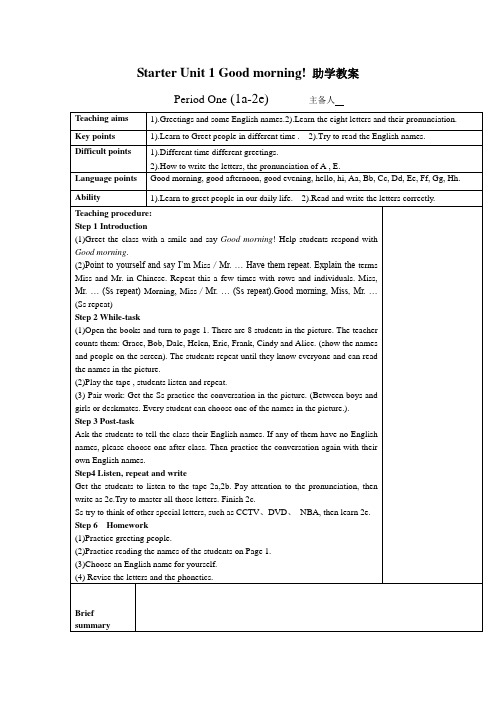
Step 5 Homework
(1).Learn the greetings in this lesson by heart.
(2).Learn the letters and phonetics by heart.
Key points
1).Learn to Greet people in different time . 2).Try to read the English names.
Difficult points
1).Different time different greetings.
2).How to write the letters, the pronunciation of A , E.
Teaching procedures:
Step 1 Warming-up
1. Try to call the eight students’ names in unit one.
2. Greet the students by saying some everyday English we have learned. Then get the students greet with each other. They can use their English names .
(2)Play the tape , students listen and repeat.
(3) Pair work: Get the Ss practice the conversation in the picture.(Between boys and girls or deskmates. Every student can choose one of the names in the picture.).
《全新版大学英语综合教程》第1册教案
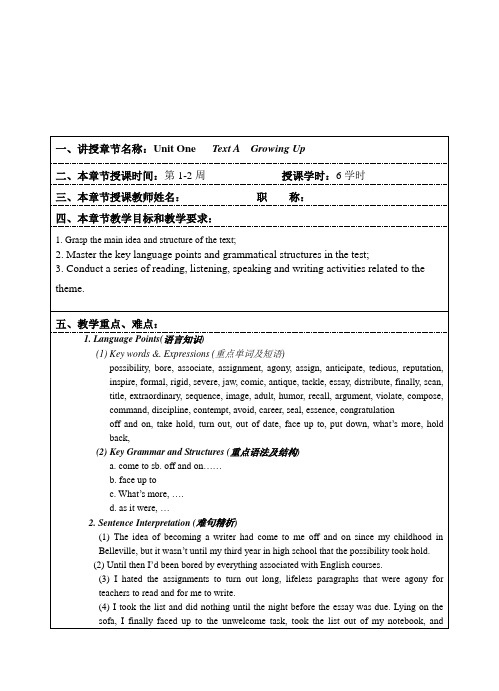
教材:《全新版大学英语综合教程》第一册(上海外语教育出版社)
主要参考书:
《全新版大学英语综合教程》第一册教师手册及助教光盘(上海外语教育出版社)
《大学英语课程教学要求》(上海外语教育出版社)
九、教学主要内容及教学安排:
Section A.(精讲)
Step One Pre-reading Activities(导入)15 minutes
(4) But the real highlight for Bill came six months after the fire, when Royce, just out of hospital, walked into the Eureka Hotel and bought him a beer.
一、讲授章节名称:Unit OneText A Growing Up
二、本章节授课时间:第1-2周授课学时:6学时
三、本章节授课教师姓名:职称:
四、本章节教学目标和教学要求:
1. Grasp the main idea and structure of the text;
2.Master the key language points and grammatical structures in the test;
(5) Neither Doris nor I had ever eaten spaghetti, and none of the adults had enough experience to be good at it.
(6) I was preparing myself for a command to report to Mr. Fleagle immediately after school fordisciplinewhen I saw him lift my paper form his desk and knock for the class’s attention.
《机电英语》教案(可编辑修改word版)

Step 2 Writing
1)submit the questions: Do you know how to write a letter of establishing business relations?
2)summarize the writing’s format, structure andfeatures.
Question-answer Teaching Approach.
Teaching aids:blackboard, multimedia,tape
Teaching procedures:
Step 1 Greetings
Step 2 Warming-up
1)ask Ss a question: What should you do as a marketresearcher?
B)Ask students to read the text again , then finish Task4 onP4.
4) Intensive Reading (here is not written.) 5)Exercises
6) Making a company introduction
2)ask Ss to turn to page 2,to look at the Task 1andTask 2,thenanswer.
Step 3 Reading A
1)Before reading the passage, try to answer the questions about companyprofile.
3)Master the basic sentencepatterns
全新版大学英语综合教程第二册教案unit 1 book2
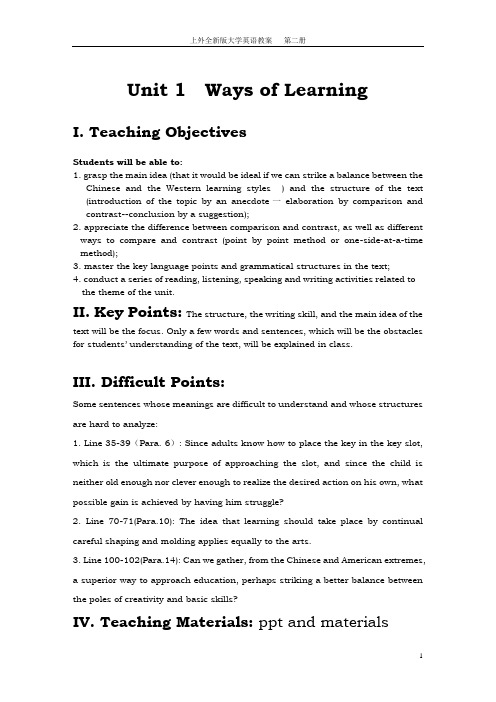
Unit 1 Ways of LearningI. Teaching ObjectivesStudents will be able to:1. grasp the main idea (that it would be ideal if we can strike a balance between theChinese and the Western learning styles ) and the structure of the text (introduction of the topic by an anecdote一elaboration by comparison and contrast--conclusion by a suggestion);2. appreciate the difference between comparison and contrast, as well as different ways to compare and contrast (point by point method or one-side-at-a-time method);3. master the key language points and grammatical structures in the text;4. conduct a series of reading, listening, speaking and writing activities related to the theme of the unit.II. Key Points: The structure, the writing skill, and the main idea of thetext will be the focus. Only a few words and sentences, which will be the obstacles for students’ understanding of the text, will be explained in class.III. Difficult Points:Some sentences whose meanings are difficult to understand and whose structuresare hard to analyze:1. Line 35-39(Para. 6): Since adults know how to place the key in the key slot,which is the ultimate purpose of approaching the slot, and since the child isneither old enough nor clever enough to realize the desired action on his own, whatpossible gain is achieved by having him struggle?2. Line 70-71(Para.10): The idea that learning should take place by continualcareful shaping and molding applies equally to the arts.3. Line 100-102(Para.14): Can we gather, from the Chinese and American extremes,a superior way to approach education, perhaps striking a better balance betweenthe poles of creativity and basic skills?IV. Teaching Materials: ppt and materialsV. Teaching Methods: Lecturing, practicing and discussing.VI. Teaching Timing: 8 sessions of classVII. Teaching Process:1st -2nd periods:Pre-reading; Teacher’s Introductory Remarks and Students’ Discussion related to the topic.3rd -4th periods: While-Reading (Understanding the title of text A; Analyzing the organization of the text; Explaining Difficult sentences and language points in the text; Summing up the main idea of the text)5th-6th periods: Dealing with the exercises after Text A. Check on Ss’ home reading (Text B); Post-Reading Task: Theme-Related Language Learning Tasks7th-8th periods: Listening and speaking tasks.A. Pre-reading tasksPre-reading tasks1.T asks Ss the following questions. The first is based on the song. Teach YourChildren: (5minutes )According to the song, who should teach whom? Is learning a one-way street?(Parents and children should teach each other and learn from each other. Learning is a two-way interaction.)Can you guess what the theme of this unit, ways of learning, refers to? (Different people have different learning styles)2. Ss listen to the fo11owing quotation from《文汇读书周报》(2001年12月1日第一版,"自主教育:“管”还是“不管”?) take some notes and then T will invite some Ss to summarize in English how Chen Yu hua’s parents handle her education.一本由中国经济出版社推出的《千万别管孩子一一自主教育哈佛启示录》的书近来极为畅销,问世才一月,在全国销售量已达到20余万册。
Unit1growingup教案

Unit 1. Growing Up(Text A Writing for Myself)Teaching ObjectiveStudents will be able to1.master the key language points and learn how to use them in context2.practice describing a person’s experience and learn about how to write a narrative3.grasp the main idea and the structure of the text.4.understand some difficult sentences and master some grammatical structure.5.understand the cultural background related to the content6.conduct a series of reading, listening and speaking.7.write a narrative “ A Memorable ---- “Teaching method1.师生互动法2. The Grammar-translation method (语法翻译法)3. The audio-lingual Method ( 听说法)Important points1. learn and master the following words and expressions: off and on, possibility,associate, turn out, anticipate, tedious, reputation, rigid, out of date, inspire,severe, tackle, face up to, scan, sequence, image, vivid, recall, put down, violate, compose, turn in, command, what is more, hold back, avoid, career,congratulation2.Master the following drills:It wasn’t until my third year in high school that---- The usage of “as” .3.Enable the students to understand the text better4.Improve the students’ reading ability5.Training the students’ listening and speaking ability6.Training the students’ writing abilityDifficult points1.How to organize the discussion and help the students finish the task of speaking 2.How to make the students understand the text better.3.How to make the students understand some difficult sentences.4.How to help the students master the usage of some words and expressions.5.Ask the students to repeat the listening materialTeaching ProcedureStep1. Before reading1) Listen to the song Beautiful Boy before class (if you have conditions) and complete the following statements according to what you have heard(在书上)补充:Questions: Do you think what the song tells us?T总结:Life becomes better as one grows up;It takes time to grow up;Life is not always what one has planned, but is full of surprises;Life is n ot easy; it’s adventurous.2) When you were children, were you were eager to grow up? (the students)3) How about now? Are you still dreaming of growing up or do you want to stay a kid once again? (the students)4) What do you think of growing up? Is it easy or full of adventures? (the students) (T: Sum up : Growing up means taking more responsibilities; conduct your responsibility; lose your family’s care; learn to be independent, learn to be yourself, learn to judge something and make your decision)5) Do you have any memorable experience in your growing up? (the students)T: You know everyone has some experiences., but in your life you will remember some special experiences which make you change your attitude to your life and yourstudy .So I would like you to discuss the topic of “ A Memorable Experience” You are given eight to ten minutes and can be divided into some groups by yourselves and discuss with each other. After the discussion, some students will come to the blackboard to show your results of your discussion .T: Sum up the students’ opinionsI think everyone of you has a great speech. I believe each of you has different experience. Some people have a great influence on your life, your study and your attitude to the world, as you say, there are teachers, parents, friends, your respected persons. In the next class, you will learn a text about Russel Baker. He wanted to tell us an unforgettable teacher’s story. It is the teacher that changes Baker’s attitude to writing. And he becomes a writer .6. Cultural notes1) The American Educational SystemIn the United States, education is the responsibility of individual states, not of the federal government, so requirements may vary from one state to another. The following is a generalization:kindergarten: under 5 years oldelementary / primary school (grades 1~6): 6~11 years oldjunior high / middle school (grades 7~8): 12~13 years oldsenior / high school (grades 9~12): 14~17 years oldcollege, institute, academy (学院), university2)The Right Way of Eating SpaghettiSpaghetti is the Italian-style thin noodle, cooked by boiling and served with sauce. Unlike some Chinese noodles, it is not served in soup and will never taste pulpy (软乎乎、没有嚼劲的).1. Hold the fork in your hand as if to poke the spaghetti.2. Scoop up a small amount of spaghetti on your fork and raise it about 30cm above your plate.3. Make sure the spaghetti on your fork is completely disconnected from the remainder on your plate.4. Put the prongs of the fork at an edge of the plate that is free of food.5. Quickly point the prongs of the fork straight down toward the plate and place the points on the plate.6. Twirl the fork to gather the spaghetti around the prongs.7. With a quick scooping movement, gather up the roll around the prongs and place it in your mouth.8. Gently gather up any stray spaghetti ends that don’t make it all the way into your mouth.Step 2. While-reading Tasks1.Scan the passage from the beginning to the end and circle all the times words,phrases and clauses and tell me what sequence did the author follow tocompose the text?since my childhood in Belleville (Para. 1)until my third year in high school (Para. 1)until then (Para. 1)when our class was assigned to Mr. Fleagle for third-year English (Para. 2)late in the year (Para. 3)until the night before the essay was due (Para. 3)when I finished (Para. 6)next morning (Para. 6)two days passed (Para. 6)when I saw him lift my paper from his desk ... (Para. 6) when Mr. Fleagle finished (Para. 9) 2.Text Questions1) What was Mr. Baker’s original attitudes towards English courses and essaywriting?original attitude : bored ( para. 1,2 )2)Which experience made Mr. Baker change his attitude?a new experience : eating spaghetti ( para. 3, 4, 5 )3).How did this experience change Mr. Baker’s attitude?changed attitude : discover a calling and write for his own joy ( para. 6, 7, 8, 9 ) 3.Text OrganizationPart 1: main ideaBaker was bored by everything associated with English courses, including writing. Part 2: main ideaBaker found himself attracted by one particular topic and wrote about it for his own joy. Part 3: main ideaThe experience of writing the essay help him discover his talent for writing and realize what he wished to do in life4. Understanding of each paragraphParagraphs Headings1 Baker’s feelings about English courses2 Baker’s impression of his new English teacher3 A topic that attracts Baker’s attention4 Vivid memories the title brought back5 Baker’s sudden desire to write about the topic6 Anticipating punishment7 Mr. Fleagle’s announcement8 Classmates’ response to the essay9 What Baker discovered5. Para to Para questionsPara.1When did the author’s dream of becoming a writer seem possible?Why had he felt bored by everything associated with English courses?Para.2What did the students think of Mr. Fleagle?According to Mr. Baker, which word could vividly describe Mr. Fleagle?Para.3Which topic attracted Mr. Baker’s attention at last?Para4: Vivid memories the title brought backWhat kind of dish was spaghetti in those days?Why were all the people in Uncle Allen’s house laughing and arguing?Para.5What did Mr. Baker write for?Para6:Did Mr. Baker prepared another essay to Mr. Fleagle’s requirements? Why?Para.7What would Mr. Fleagle do?Para 8:What was the students’response to Mr. Baker’s writing?Para.9In which way did this experience change Mr. Baker?Can you explain “ the very essence of the essay ”?6. Language points1) off and on (or on and off): from time to time, now and again, irregularlye.g. It has been raining on and off for a week. That’s why the clothes feel damp.As her patient slept soundly during the night, Nurse Betty was able to doze offand on in a bedside chair.2) take hold: become establishede.g. The idea of one child only has taken hold in many Chinese families.S: 老习惯是很难摆脱的。
新职业英语基础篇-Unit-1教案
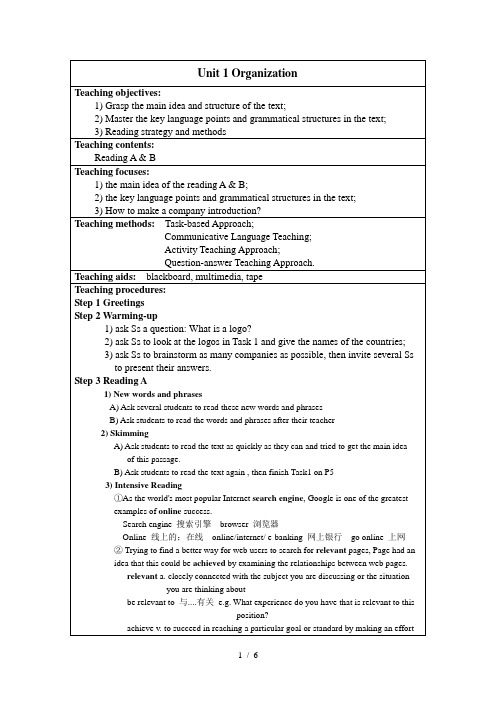
e.g. 1. The company has just acquired some new properties.
for a long time achievement n.成绩,成就
e.g. After 10 years of hard work, he finally achieved success in his business.
The techniqueappeared to besuccessful.
e.g. This company is among the first ones that went public in China.
instanta. happening immediately; (of food) that can be made quickly and easily
e.g. 1. She took an instant dislike to me.
After a few years of growthfueled byeager investors, Googlewent public. Many Googleemployees became instant millionaires.
fuelv. to increase something; to make something stronger; to supply something with material
2. instant coffee / instant noodles
全新版大学英语3教案解读

全新版大学英语(第二版)III教案(含听说)授课人:贺一舟授课班级:新能源学院10光伏材料,太阳能光热,光伏发电1,3班时间:2011年下学期Unit 1 Changes in the Way We LiveI. Teaching Object and Requirements:Students will be able to:1)grasp the mail idea ( tolerance for solitude and energy made it possible for the writer’s familyto enjoy their pleasant but sometimes harsh country life );2)appreciate the various techniques employed by the writer (comparison and contrast, topicsentences followed by detail sentences, use of transitional devices, etc.)3) master key language points and grammatical structures in the text;4)conduct a series of reading, listening, speaking and writing activities related to the theme of the unit.五、教学重点、难点:1. Word formation-----Conversion2. Structure-----When it comes to; not all/ everyone/ everything3. Confusable words-----home; house; family; household六、结合教学内容选择的主要教学方法和教学手段:教学方法:根据课文的内容,提出两个问题让学生进行思考和开展小组讨论,由此来活跃课堂气氛,进行一个课前的热身活动。
基础英语3课程大纲
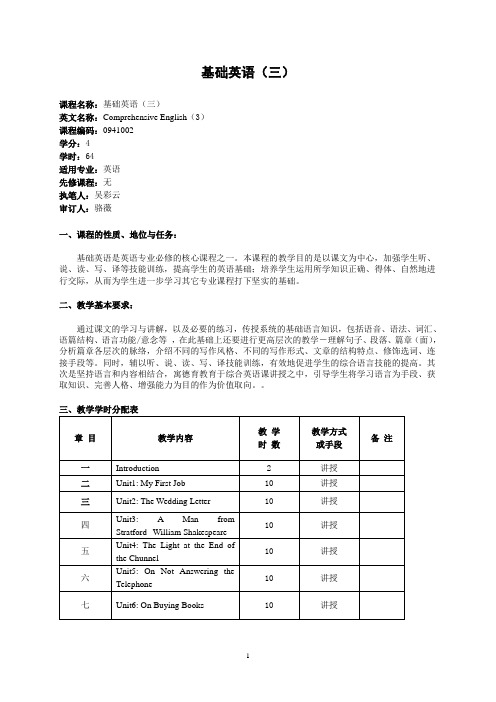
基础英语(三)课程名称:基础英语(三)英文名称:Comprehensive English(3)课程编码:0941002学分:4学时:64适用专业:英语先修课程:无执笔人:吴彩云审订人:骆薇一、课程的性质、地位与任务:基础英语是英语专业必修的核心课程之一。
本课程的教学目的是以课文为中心,加强学生听、说、读、写、译等技能训练,提高学生的英语基础;培养学生运用所学知识正确、得体、自然地进行交际,从而为学生进一步学习其它专业课程打下坚实的基础。
二、教学基本要求:通过课文的学习与讲解,以及必要的练习,传授系统的基础语言知识,包括语音、语法、词汇、语篇结构、语言功能/意念等,在此基础上还要进行更高层次的教学-理解句子、段落、篇章(面),分析篇章各层次的脉络,介绍不同的写作风格、不同的写作形式、文章的结构特点、修饰选词、连接手段等。
同时,辅以听、说、读、写、译技能训练,有效地促进学生的综合语言技能的提高。
其次是坚持语言和内容相结合,寓德育教育于综合英语课讲授之中,引导学生将学习语言为手段、获取知识、完善人格、增强能力为目的作为价值取向。
三、教学学时分配表章目教学内容教学时数教学方式或手段备注一Introduction 2 讲授二Unit1: My First Job 10 讲授三Unit2: The Wedding Letter 10讲授四Unit3: A Man fromStratford--William Shakespeare10讲授五Unit4: The Light at the End ofthe Chunnel10讲授六Unit5: On Not Answering theTelephone10讲授七Unit6: On Buying Books 10讲授八Review 2讲授机动时间四、教学内容与学时安排Introduction 2 periodsUnit 1 10 periodsTeaching Objects:Students will be able to :1.Grasp the main idea and structure of the text.2. Master the key language points and grammatical structures in the text3. Conduct a series of reading, listening, speaking and writing activities related to the theme of the unit.Teaching Focus:1. Learn the use of narration and description2. Language points and sentence patterns.3. Learn how to make preparation foe an interview4. Guided writing: paragraph writing;Teaching Steps:1. Listening in & speaking out 1 periods2. Reading comprehension 4 periodsReading I. My First JobReading II How to Do Well on a Job Interview3.Oral Work 1 periods4. Guided writing 1 periodParagraph Writing5. Exercises in workbook 3 periodsUnit 2 10 periodsTeaching Objects:Students will be able to :1. Grasp the main idea and structure of the text.2. Master the key language points and grammatical structures in the text3. Conduct a series of reading, listening, speaking and writing activities related to the theme of the unitTeaching Focus:1. To read between the lines to analyze the devices those contribute to the effective development of the main idea.2. Language points and sentence patterns.3.To do oral work on the topic of future family plans4. Guided writing: paragraph writing--third person narrationTeaching Steps:1. Listening in & speaking out 1 periods2. Reading comprehension 4 periodsReading I. The Wedding LetterReading II The Family Portrait3.Oral Work 1 periods4. Guided writing 1 periodParagraph Writing:Third-person narrators5. Exercises in workbook 3 periodsUnit 3 10 periodsTeaching Objects:Students will be able to :1. Grasp the main idea and structure of the text.2. Master the key language points and grammatical structures in the text3. Conduct a series of reading, listening, speaking and writing activities related to the theme of the unit.Teaching Focus:1. Learn the use of narration and description2. Language points and sentence patterns.3. Learn how to make preparation foe an interview4. Guided writing: paragraph writing;Teaching Steps:1. Listening in & speaking out 1 periods2. Reading comprehension 4 periodsReading I. A Man from Stratford--William ShakespeareReading II William Shakespeare3.Oral Work 1 periods4. Guided writing 1 periodParagraph Writing5. Exercises in workbook 3 periodsUnit4 10 periodsTeaching Objects:Students will be able to :1. Grasp the main idea and structure of the text.2. Master the key language points and grammatical structures in the text3. Conduct a series of reading, listening, speaking and writing activities related to the theme of the unit.Teaching Focus:1. Learn to appreciate the writing techniques in typical journalistic feature report.2. Language points and sentence patterns.3. Oral work on the topic of the new construction project in Wuhan city to develop communicative abilities.4. Guided writing: paragraph writing on narration in informal tone.Teaching Steps:1. Listening in & speaking out 1 periods2. Reading comprehension 4 periodsReading I. The Light at the End of the ChunnelReading II Confucius, the Philosopher3.Oral Work 1 periods4. Guided writing 1 periodParagraph Writing on narration in informal tone5. Exercises in workbook 3 periodsUnit5 10 periodsTeaching Objects:Students will be able to :1.Grasp the main idea and structure of the text.2. Master the key language points and grammatical structures in the text3. Conduct a series of reading, listening, speaking and writing activities related to the theme of the unit.Teaching Focus:1. Learn to appreciate to appreciate the writer’s argumentative reasoning, the rhetorical and stylistic devices used in the essay2. Language points and sentence patterns.3. Oral work on the topic of a wrong-numbered call.4. Guided writing: paragraph writing on deductive argumentTeaching Steps:1. Listening in & speaking out 1 periods2. Reading comprehension 4 periodsReading I. On Not Answering the TelephoneReading II Remote Control3.Oral Work 1 periods4. Guided writing 1 periodParagraph Writing: paragraph writing on deductive argument5. Exercises in workbook 3 periodsUnit 6 10 periodsTeaching Objects:Students will be able to :1. Grasp the main idea and structure of the text.2. Master the key language points and grammatical structures in the text3. Conduct a series of reading, listening, speaking and writing activities related to the theme of the unit.Teaching Focus:1. Learn to appreciate to appreciate the writer’s argumentative reasoning, the rhet orical and stylistic devices used in the essay2. Language points and sentence patterns.3. Oral work on the topic of whether second-hand bookshops are worth visiting.4. Guided writing: paragraph writing—persuasive writingTeaching Steps:1. Listening in & speaking out 1 periods2. Reading comprehension 4 periodsReading I. On Buying BooksReading II Online Shopping3.Oral Work 1 periods4. Guided writing 1 periodParagraph Writing—persuasive writing5. Exercises in workbook 3 periodsReview 2 periods五、考核方法与成绩评定本课程采用形成性考核与课程终结考试相结合的评估方式。
大学英语第三册Unit1TextA教案

⼤学英语第三册Unit1TextA教案Unit 1 Changes in the Way We LiveStudents will be able to:1.grasp the main idea ( tolerance for solitude and energy made it possible for the writer’sfamily to enjoy their pleasant but sometimes harsh country life);2.appreciate the various techniques employed by the writer (comparison and contrast,topic sentences followed by detailed sentences, use of transitional devices, etc.);3.master the key language points and grammatical structures in the text;4.conduct a series of reading, listening, speaking and writing activities related to thetheme of the unit.Make the Ss the real masters in class while the teacher acts as a director, a cooperator, an organizer as well as a helper;Let the Ss receive some moral education during their learning process.Teaching methods:Question-and-answer activity teaching methodPair work or individual work methodFree discussion method1. Lead-in:1) T asks Ss the following questions:—I would like to carry out a survey. How many of you live in big cities/ in small1)“I am not in E. B. White’s class as a writer…, but I’m getting by.”class: a group of people, animals or things that have similar characteristics or qualities. 等级e.g. Lu Xun was in a different class from most of his contemporaries. (He was much better than most of his contemporaries.) As a pop singer, Zhou Jielun is in a class of his own. (He is much better than most others.) league: a level of quality, ability, etc. (质量、能⼒等的)等级、⽔平e.g. Lu Xun was in a different league from most of his contemporaries. (He was much better than most of his contemporaries.) As a pop singer, Zhou Jielun is in a league of his own. (He is much better than most others.)A house like that is out of my league.get by: be good enough but not very good; manage to live or do things in a satisfactory way 过得去、尚可e.g. I manage to get by on a small amount of money each month.We can get by even without any computers to aid our English learning at the moment. paraphrase: As a writer, I’m not as famous as E. B. White, and as a farmer, I’m not so good a farmer as my neighbors. But I can manage both well enough to make myself content with my present situation.2)frustration: the state or an instance of being frustrated 挫折、令⼈失望e.g. Life is full of frustrations.frustrate: e.g. I become frustrated at/with the lack of progress in my studies.I get frustrated by repeated failures.3) living:i. adj. 活着的;⽣活的e.g. all living thingsliving conditions / standardsii. n. ⽣活、⽣计;⽣活⽅式e.g. earn/make a livingWe advocate plain living4) reliant: adj. 依赖的e.g. You can’t be solely reliant on/upon your English teacher to help your English studies. reliance: n.依赖e.g. You can’t solely place too much reliance on/upon your English teacher to help your English studies.5) “Our hens keep us in eggs, with several dozen left over to sell each week.”paraphrase: Our hens lay more eggs than we consume, so we can sell several dozen left over each week.6)“and we cut enough wood to just about make it through the heating season.”just about: ⼏乎、差不多e.g. I’ve met just about everyone in your class.“H ave you finished your homework?”“J ust about.”make it:i. 获得成功e.g. He never really made it as a painter.ii. (尤指在困难情况下)准时到达e.g. The client couldn’t make it at 3 o’clock for the appointment, so he changed the time again.paraphrase: and we cut enough wood to almost fulfill the purpose of heating in the heating season.7) canoe: n. 独⽊⾈→v. 划独⽊⾈Conversion (词类转化法): It is one of the word-formation processes in English. It is done when a word changes its class without any change of its form. P19Second part (paras 4-7):1) “... when it was 30 below”: Here the Celsius scale is used instead of the Fahrenheit scale, (see Cultural Notes)2) haul: i. transport, as with a truck, cart, etc.e.g. The farmers haul fruits and vegetables to the market on a tractor every morning. Rescue workers hauled food and water on a truck to the earthquake stricken areas.ii. pull or drag sth. with effort or forcee.g. Rescue workers hauled passengers out of the crashed train.haul, drag & pull这⼏个词都是动词,都有“拖”、“拉”、“拽”之意。
本科《大学英语1》教学大纲

《大学英语1》课程教学大纲英文名称:New College English ( Second Edition)课程编号:06110040课程类别:必修总学时数:256(理论学时:实验或实践学时:)学分:16开课单位:衢州学院适用专业:本校非英语专业一年级本科生一、课程的性质、目的和任务1.课程性质大学英语课程是大学生的一门必修的基础课程。
大学英语教学是以英语语言知识与应用技能、学习策略和跨文化交际为主要内容,以外语教学理论为指导,并集多种教学模式和教学手段为一体的教学体系。
2.课程目标和任务大学英语基础阶段的教学目标是帮助学生打下较扎实的语言基础,掌握良好的语言学习方法,增强自主学习能力,提高综合文化素养,使他们具有较强的英语综合应用能力,特别是英语口头表达能力,能用英语有效地进行信息交流,以适应社会发展、经济建设和国际交流的需要。
二、课程教学内容及教学要求Unit One Growing Up1.教学内容1)Listening Task2) Text A Writing for Myself3) Text B The Scholarship Jacket4) Comprehensive Language Practice2.重点、难点重点:Comprehension of Text A难点:Master the words, expressions and sentence structures in Text A3.教学基本要求1) grasp the main idea ( the essence of writing is to write what one enjoys writing) and structure of Text A ( narration in Chronological sequence);2) appreciate the narrative skills demonstrated in Text A ( selection of details, repetition, coherence);3)master the key language points and learn how to use them in context;4)understand the cultural background related to the content;5)express themselves more freely on the theme of Growing up after doing aseries of theme-related reading, listening , speaking and writing activities;6)write a letter of congratulations in an appropriate way.Unit Two Friendship1.教学内容1)Listening Task2) Text A All the Cabbie Had Was a letter3) Text B Never Let a Friend Down4) Comprehensive Language Practice2.重点、难点重点:Comprehension of Text A难点:Master the words, expressions and sentence structures in Text A3.教学基本要求1) grasp the main idea (never delay expressing your true feelings to a friend ) and structure of Text A (developing a story around a letter);2) appreciate the narrative skills demonstrated in Text A ( spoken English is much more informal than written English);3) master the key language points and learn how to use them in context;4)understand the cultural background related to the content;5)express themselves more freely on the theme of Friendship after doing aseries of theme-related reading, listening , speaking and writing activities;6)write a personal letter in an appropriate way.Unit Three Understanding Science1.教学内容1)Listening Task2) Text A Public Attitudes Toward Science3) Text B How to Make Sense Out of Science4) Comprehensive Language Practice2.重点、难点重点:Comprehension of Text A难点:Master the words, expressions and sentence structures in Text A3.教学基本要求1) grasp the main idea (to ensure the survival of human civilization, measures must be taken to help the public understand science ) and structure of Text A ( introducing a topic, developing the topic with supporting details, drawing a conclusion);2) appreciate the narrative skills demonstrated in Text A (Text A, Unit 1) and expository writing (Text A, Unit 3);3) master the key language points and learn how to use them in context;4) understand the cultural background related to the content;5) express themselves more freely on the theme of Understanding Science after doing a series of theme-related reading, listening , speaking and writing activities;6) write an expository essay about how science changes our liveUnit Four The American Dream1.教学内容1)Listening Task2) Text A Tony Trivisonno’s American Dream3) Text B With His Own Two Hands4) Comprehensive Language Practice2.重点、难点重点:Comprehension of Text A难点:Master the words, expressions and sentence structures in Text A3.教学基本要求1) grasp the main idea Tony Trivisonno realized his American Dream through his own efforts) and structure of Text A (one part telling the story of Tony’s life and the other giving the author’s comments on it );2) learn to describe a person by his/her characteristic features, together with supporting details which demonstrate the features;3) master the key language points and learn how to use them in context;4) understand the cultural background related to the content;5) express themselves more freely on the theme of The American Dream after doing a series of theme-related reading, listening , speaking and writing activities;6) write a narrative in the third person singular about the story of Tony Trivisonno. Unit Five Work to Live or Live to Work1.教学内容1)Listening Task2) Text A The Company Man3) Text B You Might Be a Workaholic If …4) Comprehensive Language Practice2.重点、难点重点:Comprehension of Text A难点:Master the words, expressions and sentence structures in Text A3.教学基本要求1) grasp the main idea (the author tries to define a typical workaholic in the American corporate world with the story of Phil ) and structure of Text A;2) appreciate the narrative skills demonstrated in Text A (to set the tone of irony by choice of words, selection of details, use of quotation marks, etc.)3) master the key language points and learn how to use them in context;4) understand the cultural background related to the content;5) express themselves more freely on the theme of Work to Live or Live to Work after doing a series of theme-related reading, listening , speaking and writing activities;6) write a letter of sympathy or condolence in an appropriate wayUnit Six Romance1.教学内容1)Listening Task2) Text A A V alentine Story3) Text B The Wallet4) Comprehensive Language Practice2.重点、难点重点:Comprehension of Text A难点:Master the words, expressions and sentence structures in Text A3.教学基本要求1) grasp the main idea (the way one reacts to unattractive people reveals one’s true character) and structure of Text A2) appreciate the narrative skills demonstrated in Text A (switching between tenses ,change of narrators), some rhetorical devices (simile and metaphor) and the use of informal language in conversations3) master the key language points and learn how to use them in context;4) understand the cultural background related to the content;5) express themselves more freely on the theme of Romance after doing a series of theme-related reading, listening , speaking and writing activities;6) write a letter of invitation and acknowledgement in an appropriate wayUnit Seven Animal Intelligence1.教学内容1)Listening Task2) Text A What Animals Really Think3) Text B Do Animals Fall in love?4) Comprehensive Language Practice2.重点、难点重点:Comprehension of Text A难点:Master the words, expressions and sentence structures in Text A3.教学基本要求1) grasp the main idea (some animals seem capable of thinking when it is in their own interests to do so ) and structure of Text A ( introducing, 3 subheadings to give 3 supporting examples, conclusion);2) appreciate the importance of examples in exposition;3) master the key language points in Text A and learn how to use them in context;4) understand the cultural background related to the content;5) express themselves more freely on the theme of Animal Intelligence after doing a series of theme-related reading, listening , speaking and writing activities;6) write an essay about animal intelligence using relevant examples.Unit Eight Educational Problems1.教学内容1)Listening Task2) Text A A fable of the Lazy Teenager3) Text B Ditch the Calculator4) Comprehensive Language Practice2.重点、难点重点:Comprehension of Text A难点:Master the words, expressions and sentence structures in Text A3.教学基本要求1) grasp the main idea ( teenagers’ idleness and ignorance will seriously affect both themselves and society in general) and structure of Text A ( two parts-the author’s concern and his proposed remedy);2) learn how to write a cause-and-effect analysis;3) master the key language points and learn how to use them in context;4) understand the cultural background related to the content;5) express themselves more freely on the theme of Understanding Science after doing a series of theme-related reading, listening , speaking and writing activities;6) write an essay about the use of computers in schools using cause and effect.三、建议学时分配表四、课程考核方式与成绩评定1.考核方式:2.成绩评定:总评成绩构成:平时考核(20 )%;期中考核(20)%;期末考核(60 )%平时成绩构成:考勤考纪(10 )%;作业(10)%;实践环节()%五、建议教材及参考资料建议教材:×××主编,《×××》,××××出版社,××××年版1. 《全新版大学英语》(综合教程1)第二版李荫华主编,上海外语教育出版社,2010年版2. 《全新版大学英语》(听说教程1)第二版虞苏美主编,上海外语教育出版社,2010年版3. 《全新版大学英语》(快速阅读教程1册)第二版郭杰克主编,上海外语教育出版社,2010年版4. 《全新版大学英语》(综合教程1,一课一练)第二版李荫华主编,上海外语教育出版社,2010年版参考资料:1. 《全新版大学英语》(语法手册)第二版张成炜主编,上海外语教育出版社,2010年版2. 《大学英语四级模拟训练》权威出版社最新版本3. 《大学英语四级真题》权威出版社最新版本4. 《全新版大学英语》(综合教程1)第二版教师用书李荫华主编,上海外语教育出版社,2010年版5. 《全新版大学英语》(听说教程1)第二版教师用书虞苏美主编,上海外语教育出版社,2010年版六、大纲说明需要特殊表述的大纲中未尽事宜,如课程改革、整合情况等。
八年级英语知识点

八年级(上)英语知识点Module 1 Amazing thingsUnit 1 Encyclopaedias一.Key words1.*encyclopaedia n.百科全书2. Italian n.意大利人( Italy n.意大利)3. scientist n.科学家(science n.科学:理科)4. intelligence n.才智;智慧(intelligent adj.智力的,聪明的)5. perhaps adv可能;大概6. include v.包括;包含(includes 第三人称单数)7. suddenly adv.突然;忽然8. win v(在比赛中)获胜,赢(winner n.优胜者;冠军)9. human a.人的10. inventor n发明家(invent v. 发明: invention n. 发明)11. born v ( be born)出生12. artistic adj.有艺术天赋的(art n. 艺术;artist n. 艺术家)13. invention n.发明14. even adv.(强调出乎意料)甚至15. nobody pron.没有人16. dollar n.元(美国、加拿大等属国货币单位)(dollars 复数)17. dinosaur n.恐龙18. musician n.音乐家(music n.音乐;musical adj 音乐的)19. countryside n,乡村,农村20. ability n.才能;能力(able adj 有能力的)21. notebook n.笔记本22. however adv.然而(but,同义词)23. *fossil n.化石二.Key phrases1. in the countryside在乡村;在农村2. die out灭绝;消失3. go for a walk去散步4. be born出生5. used to曾经6. as ... as像·····一样;如同7. look up(在词典或参考书中)查阅;8. see a doctor看医生9. (be) like像……10. human being人11. find out了解(到);弄清12. more than多于13. learn about学习14. (be) famous for因为……而出名15. remember to do sth.记得做某事16. help sb. (to) do帮助某人做某事17. at the end of在……的尽头/末端三、Key language points1. look up(在词典或参考书中)查阅;查检look after照顾;照看look for寻找look forward to期盼look out当心;注意I don't know the word. I have to look it up in the dictionary My mum is ill. I should look after her.My purse is missing. I am looking for it.I'm looking forward to visiting London again.Look out! The car is coming.2. as+形容词/副词原级+as像·····一样;如同The wall is as white as snow.so... as…像····一样(用于否定句)She is not as/so tall as her twin brother.She does not write as/so carefully as Tom.3. more than = over多于My grandfather is more than 80 years old.There are more than 50 students in our class.4. (be) famous fo =(be) well-known for因为……而出名Shenzhen is famous for its tall buildings.Da Vinci is famous for the Mona Lisa.5. die out灭绝;消失Dinosaurs all died out suddenly.die of+疾病、饥饿的死因The old man died of hunger.die from+负伤、劳累、交通事故的死因Thirty people died from the traffic accident last Sunday.6. invent v 发明;创造invention,n.发明;创造inventor,n.发明家Who invented the telephone?It's a very useful invention.Necessity(需要)is the mother of invention.Who is the inventor?7. used to do曾经He used to go to school by bus, but he walks to school now.Did you use to live in the countryside?be used to (doing) sth.习惯……Mum is used to getting up early.Are you used to the cold weather in the north of China in winter?8. help sb. (to) do sth.帮助某人做……Can you help the old man (to) carry the heavy bag?help sb. with sth.帮助某人做……It's kind of you to help me with my English.9. find out了解(到);弄清find v.(found, found)找到;发现found创建;创办We found out Peter broke the model dinosaur.I looked for my notebook but I couldn't find it.His grandfather founded the factory many years ago.10. go for a walk去散步It's time to go for a walk.Going for a walk every day is good for your health.四、Key grammar:A. some&any;1. some与any意为“一些;若干”,可修饰可数名词和不可数名词。
人教精通版-六年级-英语-上册-Unit 3教案

昆明路小学人教精通版六年级上册英语备课教案(Unit3)学科英语授课时间 2020 年 9 月 25 日
昆明路小学人教精通版六年级上册英语备课教案(Unit3)
学科英语授课时间 2020 年 9 月 27 日
昆明路小学人教精通版六年级上册英语备课教案(Unit3)学科英语授课时间 2020 年 9 月 28 日
昆明路小学人教精通版六年级上册英语备课教案(Unit3)学科英语授课时间 2020 年 9 月 30 日
昆明路小学人教精通版六年级上册英语备课教案(Unit3)学科英语授课时间 2020 年 10 月 9 日
昆明路小学人教精通版六年级上册英语备课教案(Unit3)学科英语授课时间 2020 年 10 月 10 日
昆明路小学人教精通版六年级上册英语备课教案(Unit3)学科英语授课时间 2020 年 10 月 26 日。
新职业英语 职业综合英语1 Unit 4 Product 电子教案
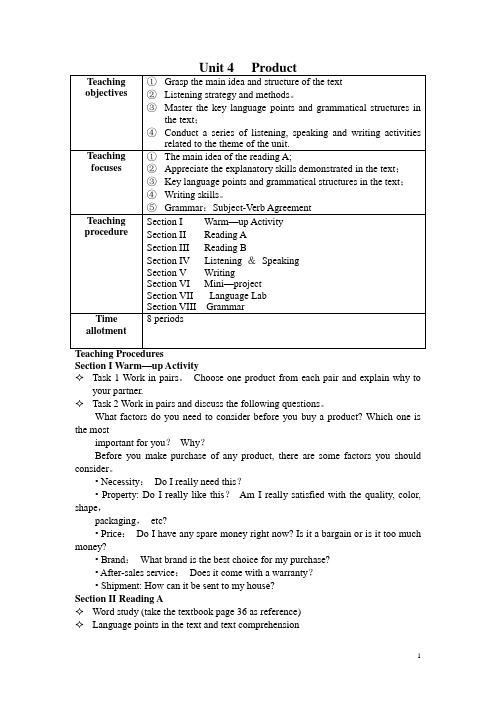
Section I Warm—up Activity✧Task 1 Work in pairs。
Choose one product from each pair and explain why toyour partner.✧Task 2 Work in pairs and discuss the following questions。
What factors do you need to consider before you buy a product? Which one is the mostimportant for you?Why?Before you make purchase of any product, there are some factors you should consider。
• Necessity:Do I really need this?• Property: Do I really like this?Am I really satisfied with the quality, color, shape,packaging,etc?• Price:Do I have any spare money right now? Is it a bargain or is it too much money?• Brand:What brand is the best choice for my purchase?• After-sales service:Does it come with a warranty?• Shipment: How can it be sent to my house?Section II Reading A✧Word study (take the textbook page 36 as reference)✧Language points in the text and text comprehension1。
初中英语说课稿教学内容
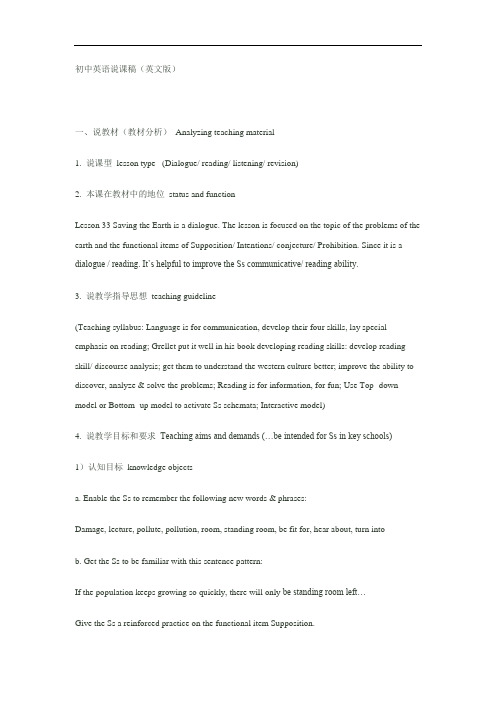
初中英语说课稿(英文版)一、说教材(教材分析)Analyzing teaching material1. 说课型lesson type (Dialogue/ reading/ listening/ revision)2. 本课在教材中的地位status and functionLesson 33 Saving the Earth is a dialogue. The lesson is focused on the topic of the problems of the earth and the functional items of Supposition/ Intentions/ conjecture/ Prohibition. Since it is a dialogue / reading. It’s helpful to improve the Ss communicative/ reading ability.3. 说教学指导思想teaching guideline(Teaching syllabus: Language is for communication, develop their four skills, lay special emphasis on reading; Grellet put it well in his book developing reading skills: develop reading skill/ discourse analysis; get them to understand the western culture better; improve the ability to discover, analyze & solve the problems; Reading is for information, for fun; Use Top- down model or Bottom- up model to activate Ss schemata; Interactive model)4. 说教学目标和要求Teaching aims and demands (…be intended for Ss in key schools)1)认知目标knowledge objectsa. Enable the Ss to remember the following new words & phrases:Damage, lecture, pollute, pollution, room, standing room, be fit for, hear about, turn intob. Get the Ss to be familiar with this sentence pattern:If the population keeps growing so quickly, there will only be standing room left…Give the Ss a reinforced practice on the functional item Supposition.c. Activate Ss schemata regarding the topic of pollution and help Ss to know more about the problem of pollution.2)智能目标ability objectsa. Ask the Ss to make up a similar dialogue.b. Help them to understand the dialogue better and improve the four skills.c. Develop their ability of thinking independently.d. Cultivate their ability to discover, analyze and solve problems.e. Train them to collect information from the Internet.f. Train them with some effective learning methods to optimize Ss’ learning results.3)德育目标moral objectsa. Arouse their interest in learning English;b. Help them to understand the background of pollution.c. Enable the students to love our earth and the nature.d. Be aware of the importance of stopping pollution & protecting out environment.e. Encourage the Ss to do something to save the earth.5. 说教学重点teaching important points (生词、句型;培养阅读技能)a. New words and phrasesb. Sentence pattern: If- clausec. improve their reading skills.d. Talking about problems of the Earth.6. 说教学难点teaching difficult points (语法;发展交际能力)a. functional item: Supposition.b. Develop their communicative ability. Act out their own dialogue.7. 说教具teaching aids (multi-media computer, software, OHP)The teaching syllabus says that it’s necessary for teachers to use modern teaching facilities. It’s of great help to increase the class density and improve our teaching result. It can also make the Ss reach a better understanding of the text by making the classes lively and interesting. At the same time, it arouses the Ss’ interest in learning English.二、说教法Teaching methodsFive step method; audio-video; communicative approach;Task-based learning: New Syllabus Design encourages teachers to use this teaching method. TBLT can stimulate Ss’ initiative in learning and develop their ability in language application. Make the Ss the real masters in class while the teacher himself acts as the director and bring their ability into full play.三、说学法Study methods1. Teach Ss how to be successful language learners.2. Teach Ss how to develop the reading skill — skim & scan; how to communicate with others; how to learn new words; how to learn independently;3. Get the Ss to form good learning habits.四、说教学过程Teaching proceduresI. 复习(Revision) 5min (Daily report; 词汇diagram; brainstorming; activate schemata)Activity 1: Imagination1). Suppose a bottle of ink is turned over and dirties your white shirt, what is to be done? (Wash it? Or throw it away?)2). Suppose you catch a bad cold, what’s to be done?3). Suppose your bike is broken, what’s to be done?4). And suppose the earth, on which we all live, is damaged, what’s to be done?* What can you think of when you see “pollution” this word?(waste, environment, air, water, factory, desert, climate... Try to activate the Ss schemata regarding the topic of pollution.)II. 呈现(Presentation) 5minActivity 2: PresentationPlay the song “Earth Song” sung by Michael Jackson. (Create a n atmosphere)A lot of pictures and video clips about the causes and results of the three problems mentioned in this lesson will be shown on the screen with the help of the computer.Ss’ presentation on pollution. Attract their attention, arouse their inte rest, and create a good atmosphere for communication.* Activate their schemata and cultivate their ability in collecting information from the Internet and develop their ability in thinking independently.III. 对话/ 阅读(Dialogue)18m1. Pre- readingActivity 3: Prediction1st listening/ fast reading, one guided Q to help Ss to get the main idea:What do you think is discussed at the conference?2. While- readingActivity 4: Read and answer2nd listening/ careful reading, more Qs to get the detailed information. Develop their reading skills: skim & scan. Pay attention to the pronunciation, stress & intonation.* 阅读: Pre-reading; while-reading; post-reading (fast reading/ careful reading; skim/ scan; 识别关键词key words;确定主题句;创设信息差information gap;T or F; 填表格chart/diagram; Predicting; Make a timeline; Make a story map。
“综合英语”(3、4)课程教学大纲
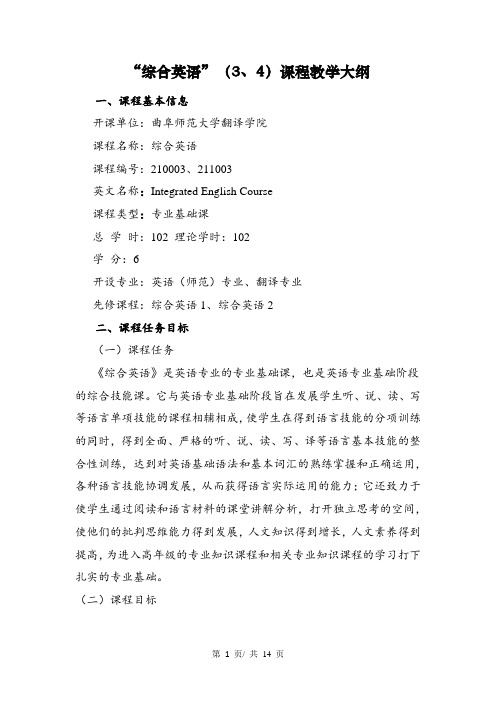
“综合英语”(3、4)课程教学大纲一、课程基本信息开课单位:曲阜师范大学翻译学院课程名称:综合英语课程编号:210003、211003英文名称:Integrated English Course课程类型:专业基础课总学时:102 理论学时:102学分:6开设专业:英语(师范)专业、翻译专业先修课程:综合英语1、综合英语2二、课程任务目标(一)课程任务《综合英语》是英语专业的专业基础课,也是英语专业基础阶段的综合技能课。
它与英语专业基础阶段旨在发展学生听、说、读、写等语言单项技能的课程相辅相成,使学生在得到语言技能的分项训练的同时,得到全面、严格的听、说、读、写、译等语言基本技能的整合性训练,达到对英语基础语法和基本词汇的熟练掌握和正确运用,各种语言技能协调发展,从而获得语言实际运用的能力;它还致力于使学生通过阅读和语言材料的课堂讲解分析,打开独立思考的空间,使他们的批判思维能力得到发展,人文知识得到增长,人文素养得到提高,为进入高年级的专业知识课程和相关专业知识课程的学习打下扎实的专业基础。
(二)课程目标1. 综合英语课程主要通过对学生进行语言基础训练与篇章讲解分析,以及通过组织学生积极参与课堂的各种语言交际活动,使学生掌握英语语音、词汇、语法的基础知识,扩大词汇量和熟悉英语常用句型,逐步提高语篇阅读理解能力,了解英语各种文体的表达方式和特点,具备基本的口头和笔头表达能力和交际技能,达到《高等学校英语专业英语教学大纲》所规定的听、说、读、写、译等技能的要求。
2. 通过一年的学习,学生的各项技能应该达到《高等学校英语专业英语教学大纲》所描述的二级要求;通过两年的学习,学生的各项技能应该达到《高等学校英语专业英语教学大纲》所描述的四级要求。
3. 在二年级,要求学生一定要打好扎实的语言基本功。
综合英语的任务是传授系统的基础语言知识(含语音、语法、语汇、篇章、结构、语言功能、意念等),训练基本语言技能(含听、说、读、写、译),培养学生良好的学习习惯,指导学习方法,加强学生思维能力和创新能力的培养。
- 1、下载文档前请自行甄别文档内容的完整性,平台不提供额外的编辑、内容补充、找答案等附加服务。
- 2、"仅部分预览"的文档,不可在线预览部分如存在完整性等问题,可反馈申请退款(可完整预览的文档不适用该条件!)。
- 3、如文档侵犯您的权益,请联系客服反馈,我们会尽快为您处理(人工客服工作时间:9:00-18:30)。
Key language points in the passage
Para1:
L1in the countryside 在乡下
L2 rose and fell升降rise-rose-risen fall-fell-fallen
There were deep cracks that(引定做主,修饰cracks) appeared in the well walls.
L3 at least至少smelly gas臭气
L4 too...to太...而不能... refuse to do sth. 拒绝做… run out of跑出
L5 looking for places to hide做伴随状语L8 be asleep沉睡as usual像往常一样Para2:
L1 as if好像come to an end 结束,完结
L2 directly 直接地L5 cut across 径直穿过
L6 dirt 泥土,灰尘in ruins 严重受损
Two thirds(三分之二) of the people who(引定做主语,修饰people) lived there were dead or injured.
L7thousands of成千上万的the number of...的数量The number of people who (引定做主语,修饰people) were killed or badly injured in the quake was more than 400,000.
Para3:
L1 nothing but 只有,除了…都没有L4blow away吹走
Most bridges had fallen or were not safe to cross.
主语+系动词+表语+to do 结构表被动
L5 railway track 铁轨tens of thousands hundreds of thousands 成千上万
L7 in shock 处于极度震惊L8 even more 更多的
L9 People began to wonder how long(引导宾语从句) the disaster would last.
Para4:
L1 Soon after the quakes, the army sent 150,000 soldiers to Tangshan to dig out those who(引定做主语,修饰those) were trapped and to bury the dead. 挖掘
L3 Workers built shelters for survivors whose(引定做定语,修饰survivors) homes had been destroyed. Medical care 医疗护理
L4 hundreds of thousands of数十万
Para5:
L1Tangshan started to revive itself and get back up on its feet.唐山开始复苏重新站起来了。
重新振作
L2 tireless 不知疲倦的
L4 Tangshan city has proved to China and the rest of the world that in times of (在...
的时候) disaster, people must unify and show the wisdom to stay positive(保持积极
的心态) and rebuild for a bright future.。
